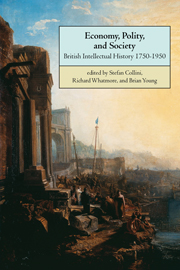Book contents
- Frontmatter
- Contents
- Preface
- General introduction
- Presentation of Economy, Polity, and Society
- Part I
- Part II
- Part III
- 9 Political and domestic economy in Victorian social thought: Ruskin and Xenophon
- 10 State and market in British university history
- 11 Mr Gradgrind and Jerusalem
- List of contributors
- Acknowledgements
- Index
10 - State and market in British university history
Published online by Cambridge University Press: 18 December 2009
- Frontmatter
- Contents
- Preface
- General introduction
- Presentation of Economy, Polity, and Society
- Part I
- Part II
- Part III
- 9 Political and domestic economy in Victorian social thought: Ruskin and Xenophon
- 10 State and market in British university history
- 11 Mr Gradgrind and Jerusalem
- List of contributors
- Acknowledgements
- Index
Summary
The historian's function is often that of restoring complexity to a past reality which some bold and excessively binary conceptual scheme has made too simple. In the present case, the conceptual villains are the terms ‘state’ and ‘market’, and the reality in question is the understanding of the development of British universities, principally in the early and mid-nineteenth century. The long reign of interventionist government in Britain, as elsewhere in Europe after 1945, effectively postponed critical discussion of the role which markets played, and continued to play, in shaping the patterns of higher education. The dramatic reversals of this policy in the course of the 1980s made it too easy for academics in Britain in particular to speak as though a long and uninterrupted, and largely benign, relationship between the state and ‘its’ universities had been rudely shattered by a wholly new insistence on introducing the play of market forces. Both the earlier orthodoxy and the more recent response tended to tell the story in over-simple terms; in particular, both worked with a reified and unhistorical notion of the opposition between ‘state’ and ‘market’ as fixed and mutually exclusive terms. This essay seeks to provide a more nuanced account of their reciprocal relationships during a key period in the shaping of universities in Britain.
In reality, the idea of the market, and of markets themselves, are relevant to any discussion of what has been termed the disintegration of the Georgian ‘confessional state’ in the early nineteenth century. This was followed by a long period of the re-shaping of the instruments of government in accordance with the presumed temper and spirit of the age.
- Type
- Chapter
- Information
- Economy, Polity, and SocietyBritish Intellectual History 1750–1950, pp. 224 - 242Publisher: Cambridge University PressPrint publication year: 2000
- 1
- Cited by



